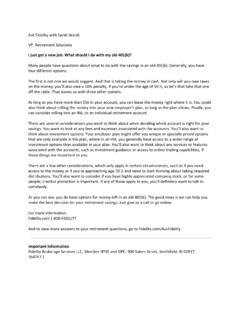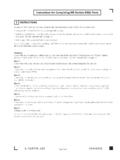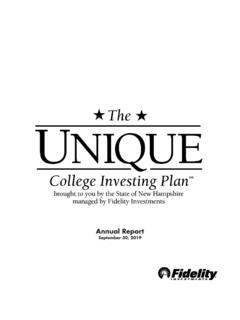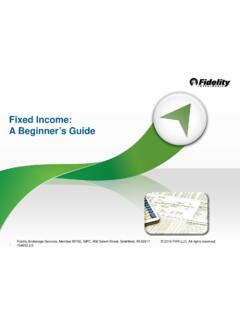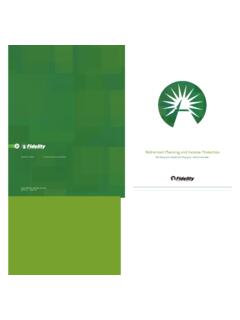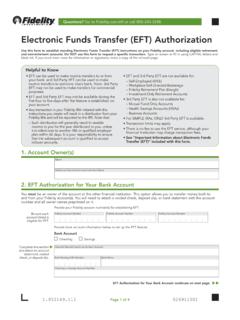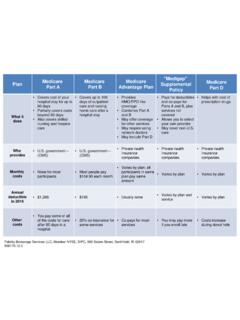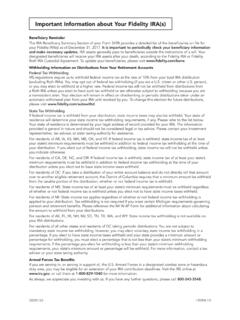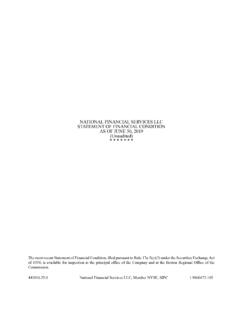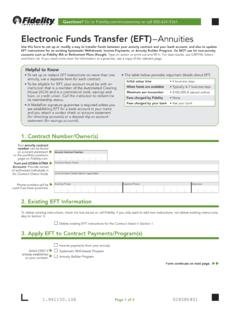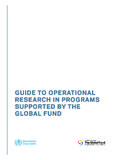Transcription of T h e L i t t l e G u y W i n s - fidelity.com
1 (over please)THE PUBLISHER S SALE OF THIS REPRINT DOES NOT CONSTITUTE OR IMPLY ANY ENDORSEMENT OR SPONSORSHIP OF ANY PRODUCT, SERVICE, COMPANY OR Reprints DO NOT EDIT OR ALTER REPRINT/REPRODUCTIONS NOT PERMITTED 50129% DOW JONES BUSINESS AND FINANCIAL WEEKLYMARCH 2, 2015In the furor surrounding last year s best-seller Flash Boys, by Michael Lewis, many retail investors were spooked by the book s claim that high-frequency traders use their technology edge to pick off the little guys, who, the author claims, were easy kill for the professionals. That part of the story was just wrong. While some in-stitutional traders have fallen behind in the computer arms race, the evidence shows that retail traders enjoy some of Wall Street s best prices on their stock orders. Surprisingly, the little guy s advantage has grown in the past couple of years. The retail trader has never had it bet-ter, says Robert Battalio, a finance pro-fessor at the University of Notre Dame who wasn t afraid to criticize stockbrokers at Senate hearings amid the Flash Boys debate.
2 When you place a market order today, you pay a lower commission, you get an immediate confirm, and very rarely are you getting worse than the price you saw when you pushed the button, he competition for retail traders or-ders actually yields a price that s better than the published quote, on average, when small investors go to buy or sell at the market price. The resulting savings can be trivial or as large as a discount bro-ker s commission, but across the industry, these price improvements were worth al-most $600 million to individual investors last year, according to financial-market analytics firm RegOne Solutions. That s much less than the billions paid out in com-missions, but it s hardly chump change. As irony would have it, these savings mostly result from the computerization of market makers and retail public has never seen much in-formation on which firms do the best job executing stock trades. So Barron s spent months analyzing trade-quality reports of the big wholesale market makers, where discount brokers send most buy orders to find a matching sell, and vice investors most often tell their brokers to issue a market order, to buy or sell the stock at the best price quickly obtainable.
3 Trading venues quote bid and ask prices on a stock, with a spread that might show a $ bid and a $ ask, for example. Brokers send the order to a market maker that might offer a price bet-ter than the quoted $ , allowing you to buy the stock at $ That is price improvement of a penny a the charts which can be seen on show, we found that the big-gest average price benefit was delivered by Citadel Securities, the market-making unit of Citadel, whose chief is hedge fund manager Ken Griffin. Citadel saved trad-ers about five bucks on a 1,000-share trade in the December quarter, according to data required by the Securities and Exchange Commission. That s a little less than a dis-count broker s $ commission but still significant. Close behind, depending on the type of stock, were the market makers at UBS (ticker: UBS), Two Sigma Securities, and KCG Holdings (KCG).The SEC mandates very little disclosure on execution quality by retail brokers, who need only report what fraction of orders they route to which exchange or market maker, plus some tidbits about payments they receive from market makers for that order compare brokers, we composed a score that reflects how much of a broker s flow it sends to the best-performing market makers.
4 The brokerage industry s scanty reporting makes any inferences tenuous, and brokers cautioned us that price im-provement is but one consideration in their choice of market makers. So consider our broker comparison a kind of first-genera-tion ultrasound image: fuzzy but as good as possible given the limited information available our scoring, fidelity Brokerage Ser-vices finished No. 1, and Charles Schwab (SCHW) and E*Trade Financial (ETFC) tied for second among discount brokers. Our broker comparison didn t include firms like Interactive Brokers (IBKR), which route most of their orders to execution is just one criterion in choosing a broker. Commissions, product offerings, and service quality matter a lot, as you ll see next week in our 20th Annual Online Broker year s heightened attention to Wall Street trading prompted an industry group to draw up a new menu of execu-tion-quality statistics that some brokers will start voluntarily disclosing in the sec-ond quarter.
5 This could provide us with a sharper picture of brokers performance. The Little Guy Wins!By Bill AlpertForget Flash Boys small investors actually get good stock prices from brokers like fidelity and market makers like Citadel. Here s those who would like to test our work, we ve posted computer scripts on GitHub, a popular Website for software collabora-tion, where you can download and repro-duce our analysis with free, open-source software. For direct links to this and other Websites mentioned, as well as additional charts, see 15 years ago, as the SEC was reducing stock-price increments to a penny, it began requiring disclosures on execution quality. Market makers and ex-changes must report monthly statistics under what s now called Rule 605. Each quarter, under the companion Rule 606, retail brokers must show the trading ven-ues where they send orders and disclose whether they got paid for that order flow. The reports are supposed to show how well brokers are fulfilling their legal obligation to get the best execution on their custom-ers trades.
6 Best execution means getting the best price possible, but also involves factors like speed and the likelihood of get-ting the trade investors know how to shop for cheap commissions, but not trade execu-tion. That may change as new industry standards emerge in coming months. Com-missions are only one part of it, says Ram Subramaniam, president of fidelity s retail brokerage business. Execution quality is another key part of the value equation, es-pecially for people who are more active. The challenge is that execution quality is not easily visible. The way most trades unfold has changed in the past decade. Like malls losing shop-pers to nearby Costcos, exchanges lost out to market makers in the competition for retail market orders. Flash Boys ascribed insidious motives to this hunger for retail order flow, suggesting that the computer-ized wolves of Wall Street were carving up uninformed small fry. The book described the launch of IEX Group, a trading venue designed to protect large orders of insti-tutional traders from getting front-run by high-speed predators.
7 IEX, however, doesn t offer a retail attempts to reach Lewis through his publisher went any case, retail traders don t need IEX s protection, because techies can t re-liably front-run small retail orders. What high-frequency trader is going to try to front-run an order that my grandma places at 3 o clock to buy GE? asks Notre Dame s venues prize retail orders above those of institutions for obvious rea-sons, says Jamil Nazarali, who heads up ex-ecution services at Citadel Securities. For market makers, rapid-fire orders from an institution can move a stock price, causing a loss. Market makers are often willing to give a better price to a retail order because we know that a retail order for 5,000 shares is probably just an order for 5,000 shares, rather than a small part of a much larger order, he says. In contrast, if a market maker fills a 5,000-share order that is part of a 100,000 share order, the market maker will likely get run over. The order-flow market is a kind of eco-nomic paradox, therefore, where small or-ders can get better prices than large or-ders.
8 At KCG, according to our analysis, most orders of fewer than 500 shares got price improvement of better than half-a-cent a share, while most orders of 5,000 or more shares got less than two-tenths of a cent a passive market maker like KCG takes the other side of small retail orders, hoping for small profits on many trades. Those profits come out of the spread be-tween the quoted bid and offer on any of the thousands of tickers the firm trades. Other large wholesale market makers are Citigroup s (C) Automated Trading Desk and the derivatives powerhouse Susque-hanna International Group, which bought the market-making affiliate of E*Trade in 2013. One way wholesalers compete is by paying for brokers order flow, which can add up to hundreds of millions of dollars a year for a broker like TD Ameritrade Hold-ing (AMTD). Another way, which directly benefits consumers, is by giving up some of the spread and offering price improve-ment by executing at a better price than the current quote.
9 That produces slightly less revenue per trade for market makers, but they hope to make it up on volume, if brokerages send more trades their way. Competition for retail order flow is intense and creates a very good deal for the retail investor, says Dave Weisberger, who ran the wholesale market-making group at Two Sigma Securities before tak-ing charge of execution-quality analysis at RegOne big players like Citadel and KCG battling for market share in the past two years, RegOne estimates that average price improvement per share at the top eight market makers has doubled from of a cent per share to of a cent, as the chart on this page shows. Those amounts look small, but so are spreads on most stocks. Across hundreds of billions of shares, it has resulted in a wealth trans-fer from Wall Street to Main Street worth more than a $1 billion in recent SEC is aware of this benefit: When it announced a pilot test of a rule that could shift some order flow from market mak-ers to exchanges, the agency exempted retail orders.
10 So measures of execution quality have become crucial exhibits in debates about such regulatory proposals. The industry s best disclosure appears on the Website of exchange operator BATS Global Markets, which has daily updates of stock-by-stock measures. The industry is headed to a world of more transparency and granular information about execution quality, says Chris Concannon, president of institutional traders have to sweat about front-running and the price impact of their big trades, a retail trader can focus on fewer quality factors. The 13 FMAMJJASOND 14 FMAMJJASONDMoreBangforYourBuck- . / . 0! 0!' 1 2 . 0 3 0 4 5 . / 6 . 7! true online retail trader doesn t have to worry about how much price impact his trade had, says Greg Tusar, who runs KCG s wholesale market-making busi-ness, but rather how much of the spread he was able to capture. In our comparisons of market maker and broker execution, we therefore focused on price-improvement measures.
